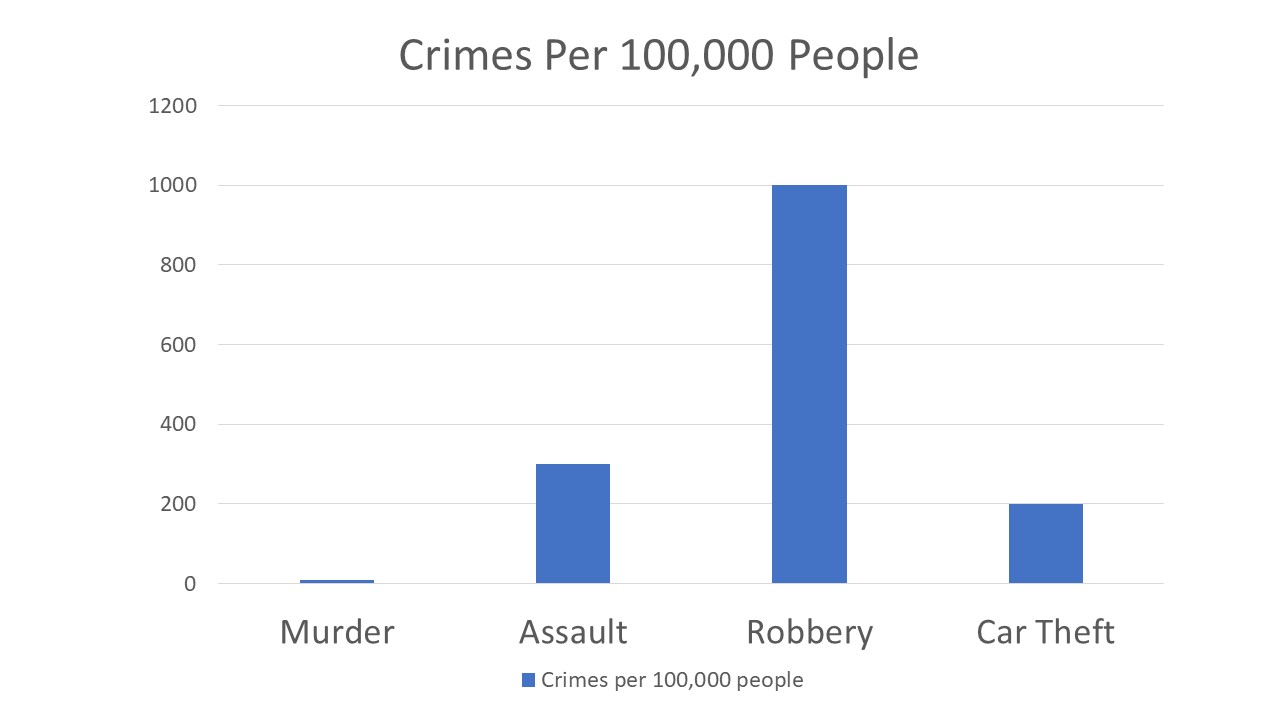The CJBAT Practice Test (2026 Guide)
Updated November 18, 2023
The Criminal Justice Basic Abilities Test (CJBAT) is an entry-level test taken by candidates looking for a career in law enforcement or corrections in Florida.
The BAT test (Basic Abilities Test) is administered by the Florida Department of Law Enforcement (FLDE). It is published by Pearson VUE in collaboration with IO Solutions.
The CJBAT is designed to measure the ‘minimum competencies’ that the FLDE has highlighted as the basic skills and personal characteristics needed to be successful in a law enforcement position.
If you apply for a position in law enforcement at entry level, you will need to take the CJBAT Test.
What Are the Sections of The CJBAT Test?
Section I: Behavioral Attributes
In this section, you will be presented with several questions designed to assess your behavioral attributes.
To be a successful member of law enforcement, your behavior, ethics and integrity are really important.
These questions are designed to demonstrate that you have what it takes in terms of your personal characteristics.
There are 47 questions that need to be answered in 20 minutes, so there isn’t much time to think about how you will answer – the best bet here is to be as honest and truthful as you can.
Section II: Memorization
Good memory skills are essential to a member of law enforcement, and this short section of the assessment is designed to see how well you can remember small details about an image in order to answer questions.
There are 10 images presented, and you will have one minute to study each image.
Once the time is up, you will be presented with a question based on the image that you will have about a minute and a half to answer.
The questions are simple enough, but you need to have paid attention to the picture to answer correctly.
Where does it look like the above picture was taken?

a) In a city center
b) In a building
c) In a dense forest
d) In a rural location
Top Tips
In the memorization question, try and think about the details that make up the picture, as that is what you are likely to be asked.
You can practice memorization skills by looking at pictures for a minute and then noting down everything that you can remember about the image.
As with other parts of this assessment, the images are likely to be directly related to law enforcement and scenarios that are relevant to the daily work of the police, so look out for news articles that have pictures relating to law enforcement in particular.
Section III: Cognitive
This is the longest part of the assessment, and you will need to answer 40 questions within an hour.
These questions are assessing your cognitive skills, the natural aptitudes that you have in terms of understanding and writing information in text, as well as the way you reach a logical conclusion based on the information given.
None of these questions need previous knowledge or experience. The answers are given in the information before the questions.
Written Comprehension
In the written comprehension section you can expect to find a written description of an incident followed by a question with multiple-choice answers.
You are being assessed on your ability to quickly read, understand and analyze the information given as text and then applying that information to answer a question.
This is a necessary skill in law enforcement as you will be expected to be able to read and understand a number of different policies, statutes and procedures while on the job.
Practice CJBAT Test with JobTestPrep
On Friday 13th, Mrs. Adams was watching television in her front room when she heard a loud bang, followed by what sounded like broken glass falling. When she went into the kitchen, there was a large stone on the floor, and the window was broken. Shaken, she called the police who attended and did a quick search but couldn’t find anyone in the area.
What was the first thing that Mrs. Adams heard that was out of place?
a) Kids screaming outside
b) Someone knocking at the door
c) Broken glass
d) A loud bang
Top Tips
In this type of question, speed of reading and accuracy is really important.
You might want to read the question before looking at the scenario so you can scan the text to find the relevant information – this can be a good strategy for people who might read a little slower.
Before the test, you can practice your written comprehension by reading articles in a newspaper and looking for important details to highlight.
Written Expression
In the written expression section, you are being assessed on how well you can utilize spelling and grammar to create coherent information.
Practice CJBAT Test with JobTestPrep
This is a skill that you will regularly use in law enforcement for things like writing reports.
The questions here are generally short and sweet, but you will need to be on top of your spelling and synonym knowledge to be most successful.
Reports suggest that 31 poeple were involved in an altercation outside the bar.
Which word is spelled incorrectly?
a) Involved
b) Altercation
c) Poeple
d) Reports
You might also be asked questions about selecting the right word to complete a sentence, so it is a good idea to brush up on synonyms and antonyms as well.
Top Tips
Again, reading is the best way to prepare for this type of Question. Reading a wide range of fiction and non-fiction sources will introduce you to more unfamiliar words, which you can then check the meaning of later.
If you feel a bit rusty about grammar rules and spelling, it is a good idea to brush up on your skills beforehand so that you are more confident about the correct structure of a sentence. This will be useful when you are looking for the correct word to complete a sentence as they can sometimes include different tenses of verbs.
Deductive Reasoning
Deductive reasoning describes the skill of being able to take general information and apply it to a specific problem in order to find a logical conclusion.
This skill is used daily by law enforcement officers to ensure that the correct course of action is taken after an incident.
In these questions, you will be provided with some information about law enforcement policies and then given a situation where you will need to apply this knowledge to choose the right course of action.
The answers are multiple-choice, and no previous knowledge is needed as all the details are provided in the policy that you need to follow.
If you need to prepare for a number of different employment tests and want to outsmart the competition, choose a Premium Membership from JobTestPrep.
You will get access to three PrepPacks of your choice, from a database that covers all the major test providers and employers and tailored profession packs.
The Police Code of Conduct states that all officers should be in full uniform at all times when on duty, except in certain circumstances that require plain clothes. Full uniform includes all designations and equipment, including body worn video, all personal protective equipment, handcuffs, baton, and gun.
Officers who do not follow this requirement will face disciplinary procedures, which could culminate in being removed from the position.
An officer is on duty in uniform but has forgotten their personal protective equipment. What would the most serious punishment be?
a) Nothing as they are on a plainclothes operation
b) A report to a supervisor
c) Being removed from the position
Top Tips
Read the policies carefully as the answers you need will be in there – but beware that there is likely to be extra information that is not needed that you will have to ignore.
Make sure you know the details of the scenario you have been given so that you can choose the most appropriate answer.

Inductive Reasoning
In the inductive reasoning questions, you will be presented with data in the form of graphs or charts relating to crimes and reporting. The graphs might relate to the number of crimes reported in a particular area or time period, and you will need to try and spot trends.
There will be a question about the data, which will need you to combine the separate details to decide on the correct answer from the multiple-choice options.
According to the graph, which crime is most prolific in the US?

a) Murder
b) Assault
c) Robbery
d) Car theft
What Is the Passing Score for the CJBAT Test?
The passing score for the CJBAT is 70, and in addition, you must answer 30 out of 50 questions correctly on Section II and Section III.
Your results will be delivered as either pass or fail; if you pass, then the score is held on file for up to four years, and law enforcement agencies can use that as part of your application.
They will not know what you scored, however.
If you fail the CJBAT, you can retake it up to three times a year, and as part of your failing report, you will get a grade and some diagnostic information, including a bar graph demonstrating your performance in each section.
You can use this information to help you prepare better for next time.
How to Prepare for the CJBAT Testing in January 2026
Step 1. Sit Past Papers/Practice Exams
There are many CJBAT study guides available online that include practice questions, and it will be really beneficial for you to sit these as if they were the real thing.
Set a timer for the required time, remove all distractions, and take the CJBAT Test – then you can look at your results and find any areas of weakness that you might need to work on.
Practice exams also help you to get used to the format of the assessment, how the questions are structured and the best way to answer the questions.
Step 2. Purchase Study Aids From iOS
There are CJBAT study guides, aids and other preparation materials available from IOS, the partners of Pearson VUE.
There is a small cost for these, but the benefits are immeasurable if you want to get the best results in the assessment.
Step 3. Do Not Neglect Sections You Find Difficult
Although it might be tempting to just concentrate on the questions that you find easier, it is not beneficial in the long run.
It is perfectly normal to have a section or question type that you find easy. In the same way, it is normal to have a section that you might find more challenging.
Try to split your focus so that you can spend a bit more time on the tougher questions by answering the easier ones faster.
Step 4. Assess Your Strengths and Weaknesses
Through CJBAT Practice Test questions and an honest assessment, you should be aware of your strengths and weaknesses – this information should be used to help you prepare and practice before the assessment.
For example, if you know that spelling is not your strength, work on learning the correct way to spell common words that might come up.
Revision of your weakest areas could be the difference between a fail and a pass, so it is worth it in the long run.
Step 5. Learn the Formats of the Questions
One of the toughest aspects of any test is not necessarily the content of the questions but the structure and layout of the assessment.
Recognizing the format of each type of question will help you focus on the best way to answer and make you feel more confident and comfortable on the day.
Step 6. Practice Against the Clock
This test is timed. While 90 minutes might seem like a long time, in CJBAT Practice Test, it will soon pass, so be prepared for that by making sure you are working against the clock in your practice.
Remember that each section is timed slightly differently:
- Section I is 20 minutes
- Section II is one minute per image plus 90 secs for the question
- Section III is one hour
Step 7. Find a CJBAT Practice That Works for You
There are many different ways you could approach the questions on the CJBAT Test, and you can maximize your chances of success by finding the best strategy to suit you.
The benefit of multiple-choice answers is that you can use the process of elimination to rule out answers that are definitely wrong, making it easier to find the correct solution.
This technique can be faster for some people and helps candidates to focus – as long as you understand the question.
If you find a question particularly difficult, move on and come back to it later if you have time.
Wasting precious moments on a tough question could mean that you are not able to answer some easier questions later on in the test, and you could miss out on correct answers.
If you do not have time, make an educated guess and move on.
Practice CJBAT Test with JobTestPrep
The CJBAT (Criminal Justice Basic Abilities Test) is a standardized exam used in the United States to assess the basic abilities and skills of candidates applying for certain law enforcement and corrections positions.
The test is designed to evaluate whether candidates possess the foundational skills necessary to work effectively in law enforcement and public safety roles.
The location where you can take the CJBAT exam depends on the jurisdiction and the specific agency or organization requiring the test.
In the United States, the CJBAT exam is typically administered by law enforcement agencies, correctional institutions and other public safety organizations at various testing centers.
The content of the CJBAT exam may vary slightly depending on the jurisdiction or agency administering the test, but it typically covers the following areas:
Written Comprehension: This section evaluates a candidate's ability to read and understand written information.
Written Expression: Candidates are tested on their writing skills and their ability to communicate effectively through written responses.
Problem Sensitivity: This section assesses a candidate's ability to recognize potential problems and identify critical issues in given situations.
Information Ordering: Candidates are evaluated on their organizational skills and ability to arrange information in a logical and coherent manner.
Deductive Reasoning: This section tests a candidate's ability to analyze information and draw logical conclusions based on the given facts or scenarios.
Inductive Reasoning: This area assesses a candidate's capacity to identify patterns, trends and relationships based on specific examples or observations.
The CJBAT is designed to assess your foundational skills and abilities related to law enforcement and corrections work.
By preparing diligently, practicing effectively, and approaching the exam with confidence, you can increase your chances of passing the CJBAT test.
Here are some general steps to follow to get your CJBAT test results:
- Wait for the Results
- Check Online Portal (If Applicable)
- Contact the Testing Agency
- Provide Identification Information
- Ask About Score Report Delivery
The total number of questions on the CJBAT test typically ranges from around 100 to 120 questions.
The questions are distributed among different sections that assess skills such as written comprehension, written expression, problem sensitivity, information ordering, deductive reasoning and inductive reasoning.
The cost of the CJBAT (Criminal Justice Basic Abilities Test) can vary depending on the jurisdiction and the agency or organization that administers the test.
The price of the CJBAT exam is typically set by the testing agency or the institution responsible for law enforcement and corrections hiring in your area.
Each agency may set its own passing score based on its specific hiring standards and needs.
It is crucial to check with the agency or organization where you are applying to determine the passing score for the CJBAT exam.
This information is usually provided on the agency's official website or in the exam's information packet.
Final Thoughts
As a standardized, entry-level assessment, the CJBAT Practice Test makes it easy for the FLDE to choose candidates for law enforcement training who possess the minimum competencies required for the job.
The test is non-biased and gives everyone the same opportunity for success while ensuring that the right questions are asked based on the skills and characteristics of a successful candidate.
The assessment is designed to be tough but not impossible, and with the right practice, preparation and mindset, it can become even more straightforward for candidates who wish to join law enforcement or corrections.




